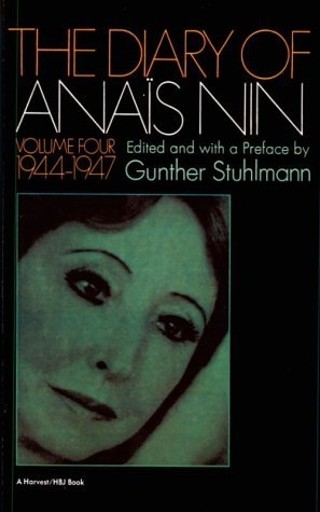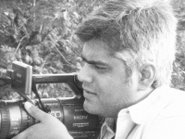Why Emotional Excess is Essential to Writing and Creativity
by Maria Popova
“Something is always born of excess: great art was born of great terrors, great loneliness, great inhibitions, instabilities, and it always balances them.”
 The third volume of Anaïs Nin’s diaries has been on heavy rotation in recent weeks, yielding Nin’s thoughtful and timeless meditations on life,mass movements, Paris vs. New York, what makes a great city, and the joy of handcraft.
The third volume of Anaïs Nin’s diaries has been on heavy rotation in recent weeks, yielding Nin’s thoughtful and timeless meditations on life,mass movements, Paris vs. New York, what makes a great city, and the joy of handcraft.
The subsequent installment, The Diary of Anais Nin, Vol. 4: 1944-1947 (public library) is an equally rich treasure trove of wisdom on everything from life to love to the art of writing. In fact, Nin’s gift shines most powerfully when she addresses all of these subjects and more in just a few ripe sentences. Such is the case with the following exquisite letter of advice she sent to a seventeen-year-old aspiring author by the name of Leonard W., whom she had taken under her wing as creative mentor.
I like to live always at the beginnings of life, not at their end. We all lose some of our faith under the oppression of mad leaders, insane history, pathologic cruelties of daily life. I am by nature always beginning and believing and so I find your company more fruitful than that of, say, Edmund Wilson, who asserts his opinions, beliefs, and knowledge as the ultimate verity. Older people fall into rigid patterns. Curiosity, risk, exploration are forgotten by them. You have not yet discovered that you have a lot to give, and that the more you give the more riches you will find in yourself. It amazed me that you felt that each time you write a story you gave away one of your dreams and you felt the poorer for it. But then you have not thought that this dream is planted in others, others begin to live it too, it is shared, it is the beginning of friendship and love.[…]You must not fear, hold back, count or be a miser with your thoughts and feelings. It is also true that creation comes from an overflow, so you have to learn to intake, to imbibe, to nourish yourself and not be afraid of fullness. The fullness is like a tidal wave which then carries you, sweeps you into experience and into writing. Permit yourself to flow and overflow, allow for the rise in temperature, all the expansions and intensifications. Something is always born of excess: great art was born of great terrors, great loneliness, great inhibitions, instabilities, and it always balances them. If it seems to you that I move in a world of certitudes, you, par contre, must benefit from the great privilege of youth, which is that you move in a world of mysteries. But both must be ruled by faith.
The Diary of Anais Nin, Vol. 4: 1944-1947 is brimming with such poetic yet practical sagacity on the creative life and is a beautiful addition to other famous advice on writing like Kurt Vonnegut’s 8 rules for a great story, David Ogilvy’s 10 no-bullshit tips, Henry Miller’s 11 commandments, Jack Kerouac’s 30 beliefs and techniques, John Steinbeck’s 6 pointers, and Susan Sontag’s synthesized learnings.







1 comment:
Thanks for posting.it touched my present state of mind. rejuvenating!
did you read the whole book?
Post a Comment